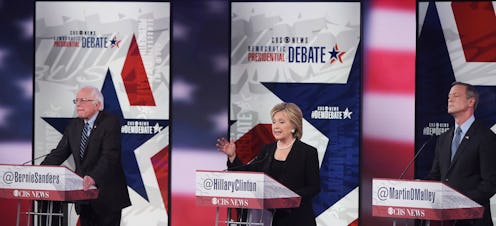News
Which Candidate Spoke For Longest At The Debate?
The second Democratic debate is finished, and as with the first one, it was substantive, professional and informative affair. Things got a little tenser than last time: Bernie Sanders and Hillary Clinton attacked each other more aggressively than ever before, and Martin O’Malley happily joined in on the mudslinging. All of them got their hits in, but when the dust settled, one Democrat had more speaking time at the debate than everyone else. And she used her time well.
Perhaps unsurprisingly, Clinton spoke for longer than anybody else. Throughout the course of the two-hour forum, the former Secretary of State and Democratic frontrunner talked for 28 minutes and 15 seconds. Sanders came in second, with a total of 24 minutes and 35 seconds of speaking time, while O’Malley talked for 17 minutes and 38 seconds.
Clinton touched on plenty of different topics during those 28 minutes — immigration, financial reform, gun control and many more. But her most powerful moments in the debate came when she discussed American involvement in the Middle East. This was one of the the first times in the campaign that Clinton has been forced to give a nuanced account of her foreign policy worldview, and she didn’t shy away from the opportunity.
When asked about ISIS, Clinton stated flatly that “this cannot be an American fight,” and that she doesn’t “think the United States has the bulk of the responsibility” in dealing with the terror group. This is important, because for years, Clinton has been perceived as one of the more hawkish, war-ready members of the Democratic Party. She has been described as a neoconservative in the mold of George W. Bush, and in the minds of many liberals, this is the biggest strike against her candidacy. Clinton fought against that perception forcefully on the debate stage tonight, arguing instead for a multilateral, coalition-based approach to foreign policy crises.
In another attempt to beat back the neoconservative label that’s sometimes been applied to her, Clinton spoke at length about how complex the politics of the Middle East are, and refused to propose a “one size fits all” solution to any of the problems facing the region.
“Each of these cases needs to be looked at individually and analyzed,” Clinton said before rattling off a list of disparate conflicts in the Middle East. “I don’t think you can paint with a broad brush. This is an incredibly complicated region of the world.”
That kind of ideology is quite different from the “good vs. evil” mindset that permeated Bush’s presidency, specifically with regard to the war in Iraq. Clinton voted to authorize that war, and it’s quite possible that she was intentionally trying to distance herself from that administration by presenting a polar opposite view of how the US should go about its foreign policy.
Of course, it’s easy to say these sorts of things at a Democratic debate; whether Clinton acts on them if she’s elected is another question entirely. But her supporters now have an easy response to progressives who accuse her of being too pro-war — and if any of those progressives were looking for a reason to change their mind and support her candidacy, they now have reason to do so.
